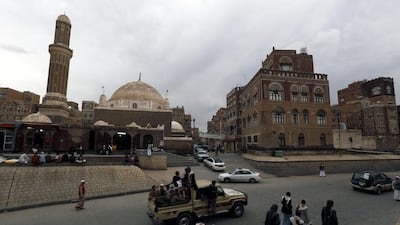SANAA // Mousa Al Sharabi, who was beaten and tear gassed by pro-Houthi fighters in the southwestern city of Taez earlier this week, welcomes the Saudi-led intervention in Yemen.
Attacked while protesting on Monday against the Shiite rebels’ takeover of his city the day before, the 22-year-old said that Yemen’s Sunnis need protection.
“We are happy that Saudi Arabia is standing up for us. Sunnis are now a minority in Yemen, at least when it comes to who has the arms and military power,” said Mr Al Sharabi.
While Sunnis are a majority in Yemen and in Taez make up 90 per cent of the population, the Houthis are well-armed and were easily able to enter the city on Sunday.
“The only reason they attacked us in the Taez protest was because we backed a Sunni political party,” Mr Al Sharabi added. “Houthis say the Shia opposition in Bahrain is oppressed, but forget they are oppressing the Sunnis in Yemen.”
While the Saudi-led strikes have so far been limited to the airbase outside Taez, rather than the city itself, Sanaa – which is surrounded by nine military bases – has been repeatedly hit.
In less than 48 hours, Yemen’s once bustling capital has turned into a ghost town. Hundreds of shops have closed down in the city and the once crowded streets are now empty. Schools closed on Thursday and will remain so for at least another week, according to the ministry of education.
Across Sanaa, houses shook at the Saudi air strikes began on Thursday morning. Thousands of families have fled the capital to stay with relatives, with many heading for rural areas outside of the city where there are no military bases. Others have returned to the provinces where they grew up.
Those who remain have flocked to supermarkets to stock up on canned goods, fearing that the intervention could last for weeks, if not months.
On Friday, the ministry of health said that at least 39 people had been killed since strikes began the day before, mostly civilians.
Electricity blackouts caused by strikes hitting power lines, as well as diesel shortages, continue for up to 10 hours a day, and Sanaa residents worry that the worst is yet to come.
Mohammed Allanah, a shop owner in the city, said he feared that Yemen could end up as destroyed as Syria.
“There is currently no hope for political talks or a deal to be reached since political factions are not meeting ... Saudi Arabia has no plan to stop its attacks on Yemen until they uproot the Houthis,” he said.
“We were happy in Yemen, though life was not perfect, until the Houthis wanted to control everything by force and sideline everyone else,” he added.
“This is the reason for all of our current problems.”
foreign.desk@thenational.ae

